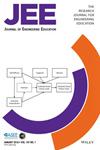Engineering students' attitudes and perceived norms toward disability and accommodations
Abstract
Background
Engineering has its own unique disciplinary culture that establishes norms and ideals. Many of these norms and ideals are centered on White, masculine, heteronormative constructs, which tend to presuppose able-bodiedness. Students with disabilities in engineering must navigate spaces that contain inherent social and physical barriers.
Purpose/Hypothesis(es)
The overarching goal of this research project is to understand the experiences of students with disabilities in engineering and to understand engineering students' attitudes and perceived norms toward disability and accommodations.
Design/Method
In a mixed-methods design, quantitative survey and qualitative interview data were collected from undergraduate engineering students at a public, Midwest, R1 institution. Quantitative and qualitative data were analyzed separately and interpreted together.
Results
Attitudes for Academic Integrity, Accommodations Process, and Classroom Climate tended toward more positive attitudes, while Disability Acceptance and Disability Disclosure tended toward negative attitudes. Qualitative findings exploring the nuances of attitudes include the ideas of faking disability and reluctance to disclose disability.
Conclusions
Hidden notions of ableist ideology seem to undercurrent perceptions of disability and accommodations. Attitudes toward disability and requesting accommodations are generally positive, but some students are still reluctant to disclose their disability or use accommodations.


 求助内容:
求助内容: 应助结果提醒方式:
应助结果提醒方式:


